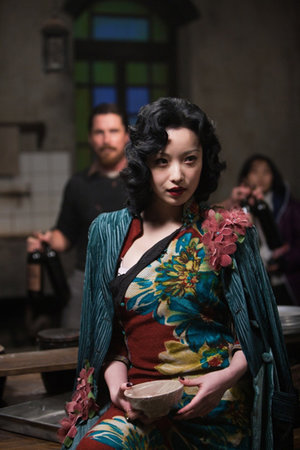 Boasting the most massive budget in the history of China’s film industry, Zhang Yimou’s lavish, occasionally tacky spectacle The Flowers Of War dares to use the rape of Nanking as the backdrop for a florid, melodramatic tear-jerker of questionable taste but undeniable emotional impact. Imagine Pearl Harbor made by somebody who knew what the fuck they were doing, and you’re halfway there.
Boasting the most massive budget in the history of China’s film industry, Zhang Yimou’s lavish, occasionally tacky spectacle The Flowers Of War dares to use the rape of Nanking as the backdrop for a florid, melodramatic tear-jerker of questionable taste but undeniable emotional impact. Imagine Pearl Harbor made by somebody who knew what the fuck they were doing, and you’re halfway there.
In 1937, while faceless, drooling Japanese soldiers pillage and bayonet their way through the bombed-out rubble of this occupied city, a rascally drunkard mortician played by Christian Bale ducks for cover in a cathedral full of abandoned orphans. Initially intending little more than to swipe the collection box while getting ripped on sacramental wine, Bale’s delightful lout soon takes a shine to the dozen or so prostitutes who have fled the red light district, seeking refuge in this house of the Lord.
As history has taught us time and again, invading armies tend to have little use for quaint conventions such as “sanctuary.” So it is only with the help of a mortally wounded Chinese super-soldier (Tong Dawei, the last man standing in Nanking) that some unspeakable atrocities are narrowly averted, and Bale eventually rouses from his stupor and dons a priest’s robe in order to shepherd his flock to safety.
The story’s inherently queasy “Caucasian savior” overtones, an obvious concession to the global marketplace, are needled outright by the filmmaker. In a sly visual gag, Bale makes his entrance during a messy shootout in a flour factory. Coated head to toe in powder, is he white enough for ya?
There’s an odd disconnect between The Flowers Of War’s shockingly violent interludes and the screenplay’s cornpone embellishments, particularly when the hookers with hearts of gold are called upon to make a certain sacrifice. But in all honestly, the formulaic flourishes felt like a bit of relief from the omnipresent rape and carnage. Bale’s conversion arc is as stock-Bogart as such archetypes get, but it’s also one of the actor’s loosest, most accessible performances. He seems surprised by his own valor.
Indeed, Zhang’s unapologetically Old-Hollywood story-telling has more than a bit in common with a certain Steven Spielberg epic in theatres right now. He might as well have called it War Whores.




